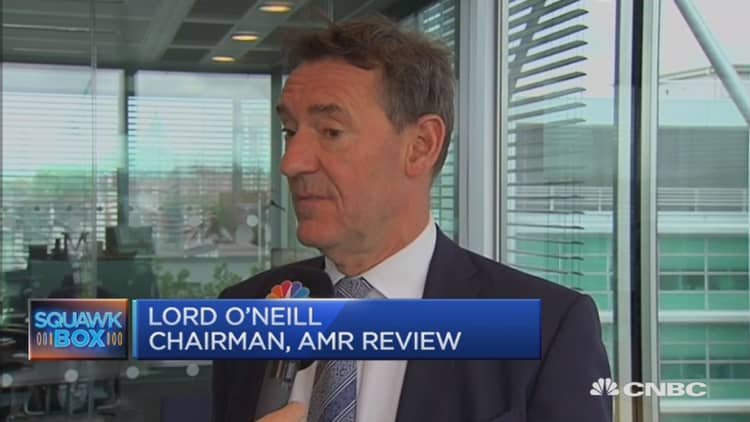
Drug-resistant infections - or "superbugs" – could claim 10 million lives a year and could cost a cumulative $100 trillion of economic output by 2050 if the world does not act to slow down the rise of drug resistance, a new report warned.
According to a global review on antimicrobial resistance (AMR), drug-resistant infections are "one of the biggest health threats that mankind currently faces" and there are fears of pandemics becoming more of a norm as antibiotics lose their efficacy.
The review was chaired by economist Jim O'Neill and he warned in the report that the world was already witnessing the alarming rise of "superbugs" that doctors are powerless to prevent or cure.
"The magnitude of the problem is now accepted," O'Neill said in a summary of the report which comes after 19 months of consultations and eight interim papers on the subject.
"Even today, 700,000 people die of resistant infections every year. Antibiotics are a special category of antimicrobial drugs that underpin modern medicine as we know it: if they lose their effectiveness, key medical procedures (such as gut surgery, caesarean sections, joint replacements, and treatments that depress the immune system, such as chemotherapy for cancer) could become too dangerous to perform. Most of the direct and much of the indirect impact of AMR will fall on low and middle-income countries," he said.
O'Neill said that it was fair to assume, at current rates, that over one million people had died since his review had started in 2014. He called that "truly shocking" and said that as well as the "tragic human costs," AMR had a "very real economic cost, which will continue to grow if resistance is not tackled."
"We estimate that by 2050, 10 million lives a year and a cumulative $100 trillion of economic output are at risk due to the rise of drug resistant infections if we do not find proactive solutions now to slow down the rise of drug resistance," he said.
Solutions not 'sweets'
O'Neill is renowned as the economist who coined the term "BRIC" in 2001 to refer to the then- emerging economic powerhouses Brazil, Russia, India and China. (103646839) He was put in charge of the U.K. government-led review of antimicrobial resistance because of his knowledge of the economic impact of such resistance.
O'Neill noted that many of the urgent problems posed by AMR are economic, "so we need an economist, especially one versed in macro-economic issues and the world economy, to create the solutions."
"It is now clear to me, as it has been to scientific experts for a long time, that tackling AMR is absolutely essential. It needs to be seen as the economic and security threat that it is, and be at the forefront of the minds of heads of state, finance ministers, agriculture ministers, and of course health ministers, for years to come," the economist warned.
The report estimated that the cost of taking global action on AMR "is up to $40 billion over a ten-year period" but that it was money well-spent. It urged governments around the world to act – and invest now – in order to avoid the potential $100 trillion cost of "inaction."

The review laid out further ways the world needed to combat AMR including calling for an increase in public awareness and surveillance of drug use, improved sanitation and hygiene around the world. There is also a need to reduce pollution from agriculture and the environment, introduce rapid diagnostics and vaccines and O'Neill called for drugs companies to be paid $1 billion for every new effective antibiotic they created in a bid to stop the over-use of existing products.
O'Neill noted that the U.K. and China had already agreed to contribute $72 million each into a new "Global Innovation Fund" to research AMR and called for other governments to contribute. The problem was ignored at our peril, he added.
"Although AMR is a massive challenge, it is one that I believe is well within our ability to tackle effectively. The human and economic costs compel us to act: if we fail to do so, the brunt of these will be borne by our children and grandchildren, and felt most keenly in the poorest parts of the world."


